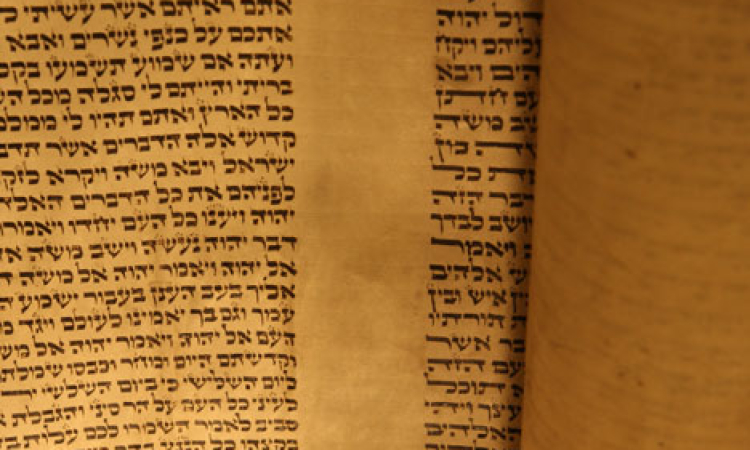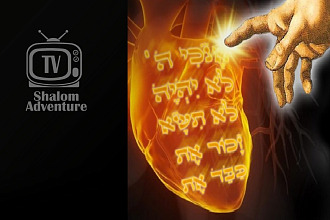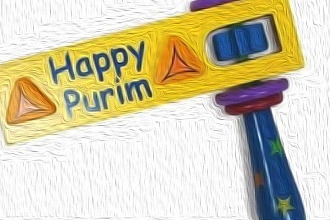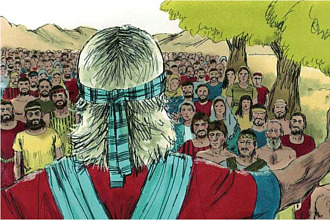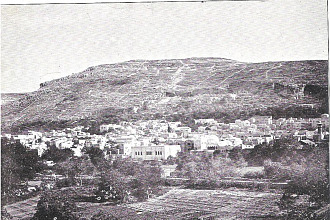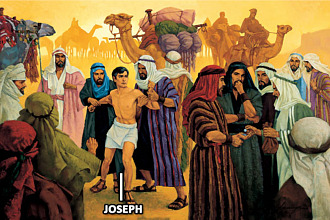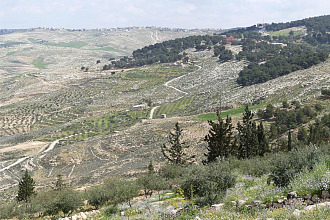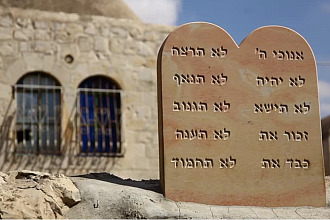Parasha for the Week: Behar: Leviticus 25:1 – 26:2
Haftarah: Jeremiah 32:6 - 27
Besorat Yeshua: Mark 3:1 – 12
Overview
The Torah prohibits farming of the Land of Israel every seven years. This "Shabbat" for the Land is called "shemita". After every seventh shemita, the fiftieth year, yovel (jubilee) is announced with the sound of the shofar on Yom Kippur. This year the Land was to lie fallow.
G-d promises to provide a bumper crop prior to the shemita and yovel years.
During yovel, all land is returned to its original division from the time of Joshua, and all Jewish indentured servants are freed, even if they have not completed their six years of work.
A Jewish indentured servant may not be given any demeaning, unnecessary or excessively difficult work, and may not be sold in the public market.
The price of his labor must be calculated according to the amount of time remaining until he will automatically become free. The price of land is similarly calculated.
Should anyone sell his ancestral land, he has the right to redeem it after two years.
For a house in a walled city, the right of redemption is limited to the first year from the sale.
The Levites' cities belong to them forever.
The Jewish people are not to take advantage of each other by lending with interest.
Families should redeem relatives who are sold as an indentured servant as a result of poverty.
"Sabbatical Year"
According to Rabbi Kalman Packouz, the two commandments, Sabbatical year and the Jubilee year, fall into one of the seven categories of evidence that God gave the Torah. If the idea is to give the land a rest, then the logical plan would be to not plant one-seventh of the land each year. To command an agrarian society to completely stop cultivating all farm lands every seventh year, one has to be either God or a meshugah (crazy). No sane group of editors would include such an "insane" commandment in a set of laws for his people; only God could command it and ensure the survival of his people for following it.
"The sabbatical year, as it was called, began at the end of the harvest. At the seedtime, which followed the ingathering, the people were not to sow; they should not dress the vineyard in the spring; and they must expect neither harvest nor vintage. Of that which the land produced spontaneously they might eat while fresh, but they were not to lay up any portion of it in their storehouses. The yield of this year was to be free for the stranger, the fatherless, and the widow, and even for the creatures of the field. (Exodus 23:10, 11; Leviticus 25:5).
But if the land ordinarily produced only enough to supply the wants of the people, how were they to subsist during the year when no crops were gathered? For this the promise of God made ample provision. "Then I will command my blessing upon you in the sixth year, and it shall bring forth fruit for three years. And you shall sow the eighth year, and eat still of old fruit until the ninth year; until its fruits come in you shall eat of the old store." (Leviticus 25:21, 22.)
The observance of the sabbatical year was to be a benefit to both the land and the people. The soil, lying untilled for one season, would afterward produce more plentifully. The people were released from the pressing labors of the field; and while there were various branches of work that could be followed during this time, all enjoyed greater leisure, which afforded opportunity for the restoration of their physical powers for the exertions of the following years. They had more time for meditation and prayer, for acquainting themselves with the teachings and requirements of the Lord, and for the instruction of their households.
In the sabbatical year the Jewish slaves were to be set at liberty, and they were not to be sent away portionless. The Lord's direction was: "And when you send him out free from you, you shall not let him go away empty; You shall furnish him liberally out of your flock, and out of your threshing floor, and out of your winepress; of that with which the Lord your God has blessed you you shall give to him." (Deuteronomy 15:13, 14) Patriarchs & Prophets 532.
One of the reasons for the Sabbatical year is that even one who owns a field will ask that year, "What will we eat?" This will make them aware of the plight of the poor, who have no fields and continuously ask, "What will we eat?"
"Shofar on Yovel"
The Torah states, "And you shall blow the shofar on the tenth day of the seventh month, on the Day of Atonement shall you sound the shofar throughout all your land. And you shall sanctify the fiftieth year, and proclaim liberty throughout the land to all its inhabitants; it shall be a jubilee for you, and you shall return every man to his possession, and you shall return every man to his family" Leviticus 25:9,10, According to Rabbi Zelig Pliskin, this teaches a lesson regarding coping with suffering from the commandment to blow the shofar in the fiftieth year, the Yovel (Jubilee year). The reason for this is that on the Yovel the servants were set free. When a master had a servant for a long period of time, it was hard for him to lose the helping hand. The shofar was blown for the master to realize that he was not the only one to free his servant. Rather, the same was happening to everyone else who had servants. The knowledge that others are also suffering in the same way makes it much easier to accept hardships.
"On the tenth day of the seventh month, on Yom Kippur, in the Day of Atonement," the trumpet of the jubilee was sounded. Throughout the land, wherever the Jewish people dwelt, the sound was heard, calling upon all the children of Jacob to welcome the year of release. On the great Day of Atonement satisfaction was made for the sins of Israel, and with gladness of heart the people would welcome the jubilee." PP 533.
"Year of Jubilee"
Every fiftieth year, the year of jubilee, every inheritance in the land was to be restored to its original owner. "In the year of jubilee ye shall return every man unto his possession," God declared. Thus in His infinite wisdom the Lord educated His people. His requirements were not arbitrary. Connected with all the instruction received by the people from the Source of all light was the consequence of obedience and disobedience. They were taught that obedience would bring them the richest spiritual grace, and would enable them to distinguish between the sacred and the common. Disobedience would also bring its sure result. If the people chose to manage the land in their own supposed wisdom, they would find that the Lord would not work a miracle to counteract the evils He was trying to save them from. The Lord presented to His people the course they must pursue if they would be a prosperous, independent nation. If they obeyed Him, He declared that health and peace would be theirs, and under His supervision the land would yield its increase.
"Yovel and Messiah"
The yovel was a lesson for Israel to learn the freedom which will be given by the Messiah. The spirit of the Lord God is upon me; because the Lord has anointed me to announce good news to the humble; he has sent me to bind up the broken hearted, to proclaim liberty to the captives, and the opening of the prison to those who are bound; To proclaim an acceptable year of the Lord, and the day of vengeance of our God; to comfort all who mourn (Isaiah 61:1-2) The Messiah received a full portion of the Ruah Elohim (the Spirit of God)
- to preach the good news to the poor,
- to bind up the brokenhearted
- to proclaim freedom for the captives
- to release from darkness for the prisoners
- to proclaim the year of the LORD's favor.
- to comfort all who mourn
When our Messiah came he said that he came to fulfilled this text "Yeshua returned to Galilee in the power of the Spirit, ... On the Sabbath day he went into the synagogue... And he stood up to read. The scroll of the prophet Isaiah was handed to him. Unrolling it, he found the place where it is written: "The Spirit of the Lord is on me, because he has anointed me to preach good news to the poor. ... Then he rolled up the scroll, gave it back to the attendant and sat down. The eyes of everyone in the synagogue were fastened on him, and he began by saying to them, "Today this scripture is fulfilled in your hearing." All spoke well of him and were amazed at the gracious words that came from his lips." (Luke 4:14-22)
Haftarah: Jeremiah 32:6 – 27
Haftara: In this text of Jeremiah we have an illustration of the year of Yovel. "Jeremiah said, 'The word of the LORD came to me: Hanamel is going to come to you and say, "Buy my field that is at Anathoth, for the right of redemption by purchase is yours'" (Jer. 32:6-7).
However, Jeremiah wanted to be certain that this revelation was truly from God. It was a strange order. Jeremiah had received the revelation from God that the people of Israel would be deported to Babylon, Jerusalem and the temple would be destroyed. There was no sense in buying a property now. It would be better to keep these seventeen shekels of silver. The Lord confirmerd to Jeremiah that this revelation was true. "Then my cousin Hanamel came to me in the court of the guard, in accordance with the word of the LORD, and said to me, 'Buy my field that is at Anathoth for the right of possession and redemption is yours; buy it for yourself.' Then I knew that this was the word of the LORD" (Jer. 32:8). He obeyed and bought the land.
Why did the Lord want Jeremiah to spend this money in Jerusalem, to buy land that would be taken by the Babylonians? "Thus says the LORD of hosts, the God of Israel: Take these deeds, both this sealed deed of purchase and this open deed, and put them in an earthenware jar, in order that they may last for a long time. For thus says the Lord of hosts, the God of Israel: Houses and fields and vineyards shall again be bought in this land " (Jer. 32:14-15).
The main message of this purchase is that there is hope. God is not going to abandon his people or to reject them. He wants to teach them a lesson. He wants to push them to fulfill his mission which is to share the knowledge of God.
Besorat Yeshua: Mark 3:1 – 12
Parasha: Our text of Leviticus is about the Sabbatical year. Through the action of Israel on the Sabbatical Jubilee year, God wants to teach to Israel the right way to keep the Shabbat. "You shall return, every one of you, to your property and every one of you to your family. ... In this year of jubilee you shall return, every one of you, to your property.... When you make a sale to your neighbor or buy from your neighbor, you shall not cheat one another. ... but you shall fear your God; for I am the LORD your God " (Leviticus 25:3). If anyone of your kin falls into difficulty and sells a piece of property, then the next of kin shall come and redeem what the relative has sold. (Leviticus 25:25-26).
Besorah: Yeshua wanted to illustrate in his way how to keep the Shabbat. "Again he entered the synagogue, and a man was there who had a withered hand. They watched him to see whether he would cure him on the Sabbath, so that they might accuse him. And he said to the man who had the withered hand, "Come forward." Then he said to them, "Is it lawful to do good or to do harm on the Sabbath, to save life or to kill?" (Mark 3:-1-4).
The Shabbat is to be a blessing for all human beings and it is permissible to do good on Shabbat. That's why Yeshua healed this man on Shabbat. It is true that he could have healed this man any day of the week, however it was a good time to demonstrate God's love on Shabbat. It is time to come back to the true keeping of the Shabbat taught by the Mashiach, in words and in actions.

